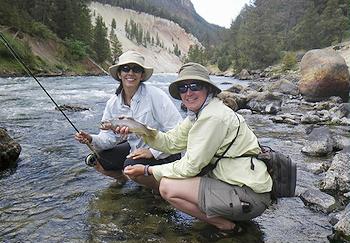
WASHINGTON, DC, March 15, 2013 (ENS) – Hunters and anglers from across the United States are concerned about the impact of climate change on wildlife and natural resources and also on the U.S. hunting and angling economy, worth roughly $120 billion a year.

As a coalition, they are asking President Barack Obama to follow through on his promises to act against warming temperatures given in his Inaugural Address in January and in his State of the Union speech in February.
Ten groups representing millions of anglers, hunters, scientists and conservationists sent a letter to the President on Monday asking that the Obama administration “develop and implement climate change adaptation strategies that support the resiliency of fish and wildlife populations.”
“Because of the time we spend in the woods, fields, lakes and rivers, changes in weather patterns are not an abstraction to us,” the groups say in their letter to the President.
“This past year alone, we saw iconic rivers such as the Yampa in Colorado and Madison in Montana closed to fishing due to high water temperatures. Likewise, we saw droughts in the Midwest dry up duck marshes, and wildfires of uncommon intensity burn more than 9 million acres of game habitat,” they write.

In another example, given by one of the groups, Ducks Unlimited, because of the ongoing drought, the Lower Colorado River Authority will not release Highland Lakes water to most downstream farmers this year. This is the second consecutive year that most of the lower Colorado River basin’s rice farmers will go without Highland Lakes water to irrigate their crops.
Ducks Unlimited says this means that waterfowl, wading birds and other wetland wildlife will face another year of reduced habitat availability in the critical wintering area of the Texas Mid-Coast.
Some 60 percent of the nearly two million birds in the midwinter waterfowl population for the Texas Mid-Coast are expected to rely on active and idle flooded rice fields for food.
While he understands that drought conditions require conservative water management, Dr. Todd Merendino, Ducks Unlimited manager of conservation programs, said, “Withholding water from rice growers for a second straight year represents another setback for wintering waterfowl and an insurmountable economic challenge for local economies dependent on agriculture and waterfowl hunting.”
The groups are asking Obama to use his executive power “to protect, reconnect and restore fish and wildlife habitats in service of a climate adaptation strategy, and to maintain current conservation programs as budget priorities.”

They are asking that existing federal conservation funding programs not be cut because these funds “will be critical to adaptation strategies when done in concert on a landscape scale.”
Agencies should find ways to prioritize lower cost natural system restoration and protection over built-infrastructure where feasible, the group urge in their letter. “For example, the restoration of mountain meadows can improve habitat and contribute to groundwater recharge to provide more reliable water supplies for downstream communities.”
“Restoration of floodplains likewise creates valuable fish and game habitat while reducing the impacts of flooding on human communities,” the letter states.
The groups call for “common sense approaches” such as these that can help communities better prepare for drought and floods that warming temperatures will bring while also benefiting fish and wildlife.
“Our organizations are ready to help with this work,” the groups offer in their letter. “Our members and staff dedicate millions of hours to conservation projects that help enhance resiliency so that future generations can enjoy the same sporting opportunities we have today, and the $120 billion hunting and angling economy can be sustained.”
“As you direct the federal agencies’ responses to the immense challenge of climate change,” the groups write, “we respectfully urge you to take a comprehensive approach with an immediate and robust effort to conserve, reconnect, and restore the lands and waters that Americans rely on for fishing, hunting, and outdoor recreation.”
The groups that signed the letter are:
American Fisheries Society
American Fly Fishing Trade Association
Bass Anglers Sportsmen Society
Ducks Unlimited
Izaak Walton League of America
Quail Forever
Pheasants Forever
Trout Unlimited
Theodore Roosevelt Conservation Partnership
Wildlife Management Institute
Copyright Environment News Service (ENS) 2013. All rights reserved.
© 2013, Environment News Service. All rights reserved. Content may be quoted only with proper attribution and a direct link to the original article. Full reproduction is prohibited.
